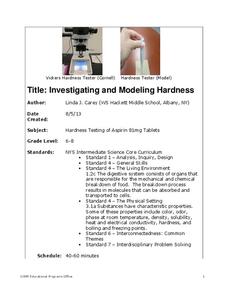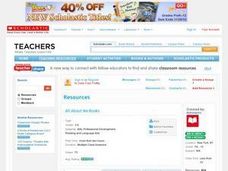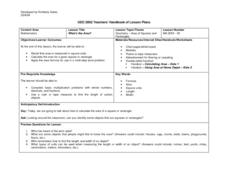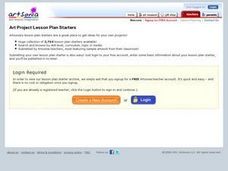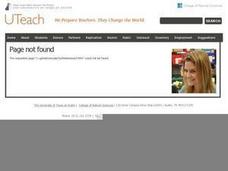DiscoverE
Textbook Support Challenge
Textbooks are heavier than a sheet of paper, so how can paper hold up a textbook? Young engineers create a structure out of paper that can support a textbook. To add another wrinkle, they must stay within budget and time constraints.
Scholastic
Discussion and Dissection of an Owl Pellet
Young scientists get the chance to dissect pellets "owl" by themselves to determine the owls environment and nourishment. This is the third part of a three-part series.
Curated OER
Putting the Pieces Together
Children explore fractions on a conceptual level by making individual quilt squares. Each student works with small paper swatches to divide them into pieces that represent a given fraction. The class is then separated into groups and...
Curated OER
An Electro-Olympic Event: Lemon vs. Lime
Students design a battery, identify and label the anode, cathode, electron flow, ion flow, oxidation & reduction reactions, chemicals used including the location of each;and distinguish between anode materials with regard to energy...
Virginia Department of Education
z-Scores
Just how far away from the mean is the data point? Pupils calculate the standard deviation for a set of data and find out how many standard deviations a point is away from the mean. The teacher leads a discussion on how to calculate...
DiscoverE
Sun-Warmed Treats
Treat your class to a fun activity, complete with treats. Groups create a solar oven from a pizza box. They then use it to heat up some food ... that's what an oven is for, after all!
Curated OER
Paper Weaving
Practice the native concept of weaving with traditional classroom items. Using assorted colors of construction paper, your class will simulate how to weave. This is a great activity to connect to a Native American, Mexican, or other...
Cornell University
Investigating and Modeling Hardness
Model hardness testing with a self-designed hardness test. Young scholars rate the hardness of different types of aspirin using the Vicker's Hardness scale. They then relate hardness to the solubility of each aspirin tablet.
Curated OER
All About Me Books
Students examine literature of emergent readers, categorize books into types of literature common for primary readers (wordless, pattern, alphabet, number, rhyme, etc.), and write a book about themselves to give as gifts to their new...
Curated OER
poem "Smart" by Shel Silverstein from "Where the Sidewalk Ends"
Middle schoolers incorporate their conceptual understanding of proportions to write a creative piece similar to the example poem.
Curated OER
You Can Take the Pressure!
Learners construct and use a barometer over a period of 1-2 weeks to investigate and predict upcoming weather from barometric pressure.
Curated OER
What's the Area?
Fifth graders use area to calculate the cost for new flooring. They find the area of a square or rectangle. Calculating Area problems and worksheet are attached.
Alabama Learning Exchange
Investigating Friction
Young learners explore friction. They view a video or DVD (bibliography provided) and define terms related to friction, and work in groups to experiment with the effects of friction on speed and motion using ramps and toy cars.
Curated OER
Medieval Castles
Second graders design a scale model of a medieval castle and its surroundings including the following items: castle, moat, bailey, drawbridge, turrets, dungeon, grounds, and outer walls. A perfect lesson for those kids who are fascinated...
Curated OER
Value Study Marker -- Using Chuck Close as a Catalyst
Sixth graders examine the work of artist Chuck Close. They create their own image using markers that show a range of values. They develop a grid to replicate those values.
Curated OER
Value Study Pencil -- Using Chuck Close as a Catalyst
Seventh graders examine the life of artist Chuck Close. They use markers to create an image to show a range of values. They develop a grid to represent these values.
Curated OER
I Wonder How Fast Manduca Grows Compared To Me
Learners study the Manduca bug and its growth data. They look for patterns and compare their own growth rate to that of the Manduca.
Curated OER
Vincent VanDuca
Students create art with the Manduca by placing gel on their body and letting them walk over colored paper. They discover what their footprints and movements are like. They create a piece of art by using the Manduca markings.
Curated OER
Impress Yourself: Textured Pendants
Students experiment with textures and polymer clay while creating individual pendants. This lesson is suitable for all ages and includes ideas for adding "personal touches" to each pendant, baking the pendants, and applying texture and...
Curated OER
Tick Around the Clock
Students examine and discuss the differences between clocks they are shown. Using the internet, they research how people used to tell time before clocks. They review what the long and short hand on the clock represent and practice...
Alabama Learning Exchange
Origami Geometry
Origami is an excellent way to combine Japanese culture, art, and geometric shapes into one engaging instructional activity! Scholars begin by listening to the story Sadako and the Thousand Paper Cranes and learn the origin of...
Curated OER
Building a Telescope
High schoolers construct a simple refracting telescope. They calculate the magnification.
Curated OER
Cap-It to the Max
Eighth graders compare the volume of three cylinders constructed from the same size sheet of paper. They use concrete and graphical models to derive formulas for finding perimeter, circumference, area, and volume of two and three...
Alabama Learning Exchange
How Old Is That Tree?
Fifth graders study environmental changes by examining the annual rings of a cross-section of a tree trunk. They access websites to complete a worksheet on the parts of a tree. They count the annual rings on a tree slice while observing...







